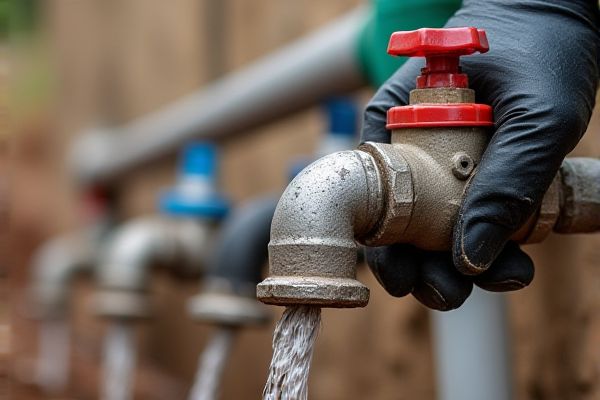
Kenya's plumbing job market is experiencing notable growth, driven by urbanization and infrastructure development. Skilled plumbers are in high demand for both residential and commercial projects, including new buildings, renovations, and maintenance. Various organizations and technical institutions offer training programs to equip aspiring plumbers with essential skills, making it easier to enter the profession. Networking opportunities through trade unions and professional associations further enhance job prospects, helping plumbers connect with employers and find available positions.
Job Description
Plumbing jobs in Kenya encompass a variety of essential tasks, from installing and repairing water supply systems to ensuring effective drainage solutions. Skilled plumbers often work on residential and commercial projects, connecting homes and businesses to vital water services. Understanding local building codes and regulations is crucial for compliance and safety during installations. Opportunities in this field are growing, driven by urban development and improvements in infrastructure across the country.
Requirement
Plumbing jobs in Kenya require specific skills and certifications to meet industry standards. Most employers look for candidates with a plumbing certificate from a recognized institution, alongside hands-on experience in installation and repair work. Familiarity with local building regulations and safety codes is essential to ensure compliance and excellence in service. Your ability to communicate effectively and work well within a team can significantly enhance your job prospects in this growing field.
Salary and Perks Expected
Plumbing jobs in Kenya offer competitive salaries, typically ranging from KSh 40,000 to KSh 100,000 per month, depending on experience and expertise. The availability of pipeline jobs in urban areas has increased due to ongoing infrastructure projects, creating more opportunities for skilled plumbers. Your compensation package may also include additional perks, such as health insurance, transportation allowances, and opportunities for overtime. Investing in specialized training and certifications can further enhance your employability and potential salary in this growing sector.
Similar Job Names
- Plumber
- Pipefitter
- Plumbing Technician
- Plumbing Supervisor
- Water Supply Technician
- Drainage Technician
- Plumbing Engineer
- Gas Fitter
- Maintenance Plumber
- Construction Plumber
- Plumbing Project Manager
- Sanitary Installer
- Welder
- Plumbing Sales Representative
- Plumbing Inspector
Job Expectation Concept
The plumbing job market in Kenya is evolving, reflecting the country's growing infrastructure needs. Skilled plumbers are in high demand to install and maintain various pipeline systems, including water supply and wastewater management. Opportunities range from residential projects to large-scale commercial developments, offering competitive salaries for qualified individuals. Emphasizing practical training and certifications can significantly enhance your employability in this vital sector.
Career Advantage and Weakness
Plumbing jobs in Kenya offer a significant career advantage due to the increasing demand for skilled professionals in both urban and rural areas, driven by ongoing infrastructure development projects. The potential for high earnings exists as well, particularly for experienced plumbers who can navigate complex installations and repairs. However, challenges include the lack of formal training programs, which may impact job security for those without proper certification. As you consider a plumbing career, it's essential to weigh these factors to ensure a sustainable and rewarding future in this essential trade.
Important Thing Must Know
In Kenya, plumbing jobs often require a combination of technical skills and knowledge of local building codes. Understanding the materials and tools specific to the region can enhance the efficiency and quality of your work. Apprenticeships or formal training programs are valuable for gaining hands-on experience and establishing a professional network. Many plumbing jobs also involve installation, maintenance, and repair of pipelines that are critical for water supply and sanitation. Awareness of the environmental regulations surrounding plumbing helps ensure compliance and sustainability in your projects.
Alternative Career Options
Exploring alternative career options in the plumbing sector in Kenya can lead to lucrative opportunities beyond traditional plumbing jobs. Consider roles in pipeline construction and maintenance, which are critical for infrastructure development, especially in urban areas. The growing demand for skilled professionals in water supply and drainage systems offers pathways into project management or consultancy roles. Continuous skill enhancement through vocational training can further position you favorably in this evolving job market.
Companies List
- Nairobi Water and Sewerage Company
- Kericho County Water and Sanitation Company
- Kenya Pipeline Company
- Rift Valley Water Services Board
- Coast Water Services Board
- Kisumu Water and Sewerage Company
- Eldoret Water and Sanitation Company
- Nyeri Water and Sanitation Company
- Meru Water and Sanitation Company
- Kenya Urban Roads Authority
List of Ideal City
Nairobi offers a vibrant job market for plumbing professionals, with numerous construction projects and ongoing infrastructural developments. Mombasa, as a coastal city, presents opportunities especially in residential and commercial plumbing due to its growing tourism sector. Kisumu is expanding rapidly, making it an attractive option for plumbers skilled in both installations and repairs. Eldoret, known for its agricultural base, also sees a rise in plumbing needs, particularly in new housing and industrial facilities.
 jobs-kenya.com
jobs-kenya.com